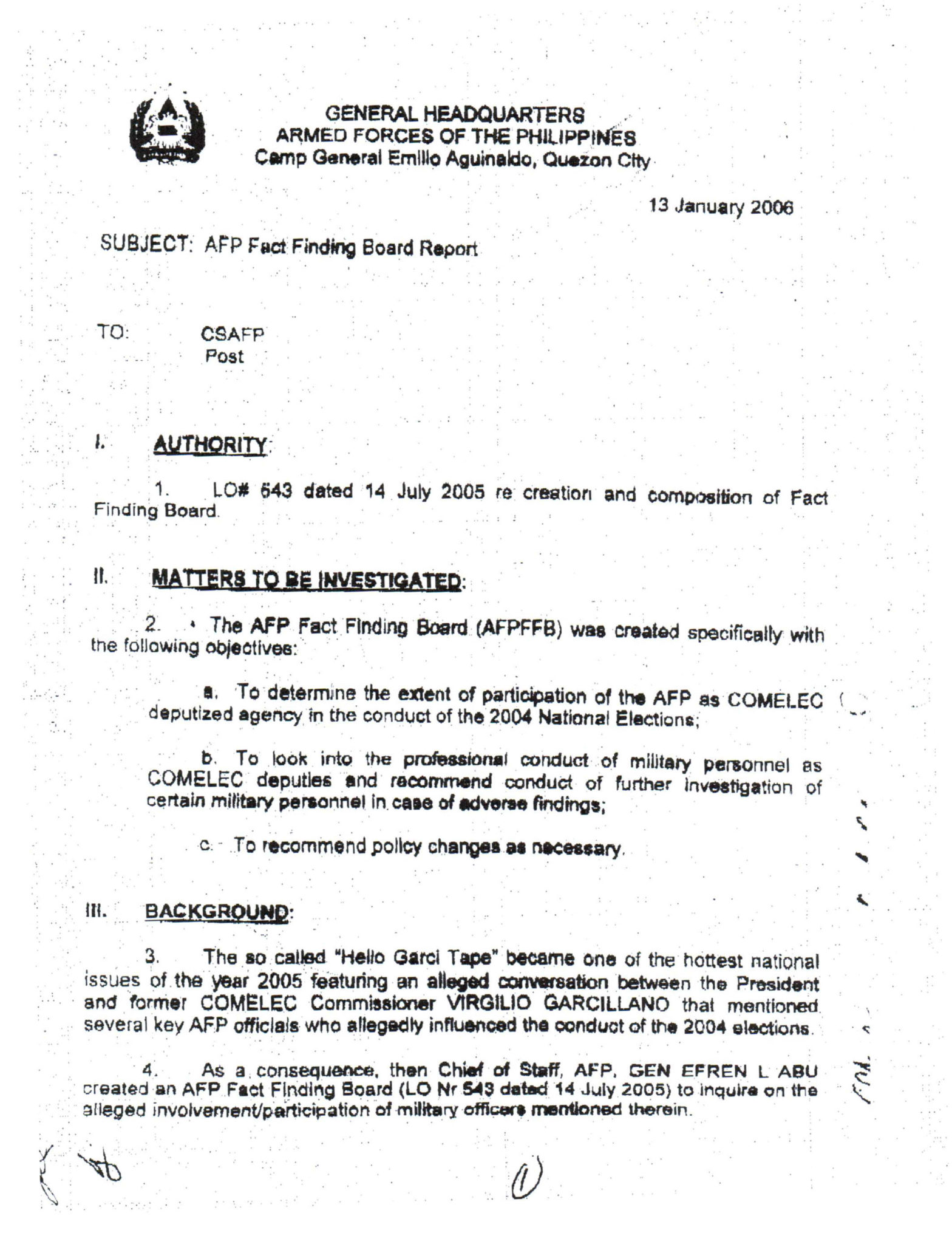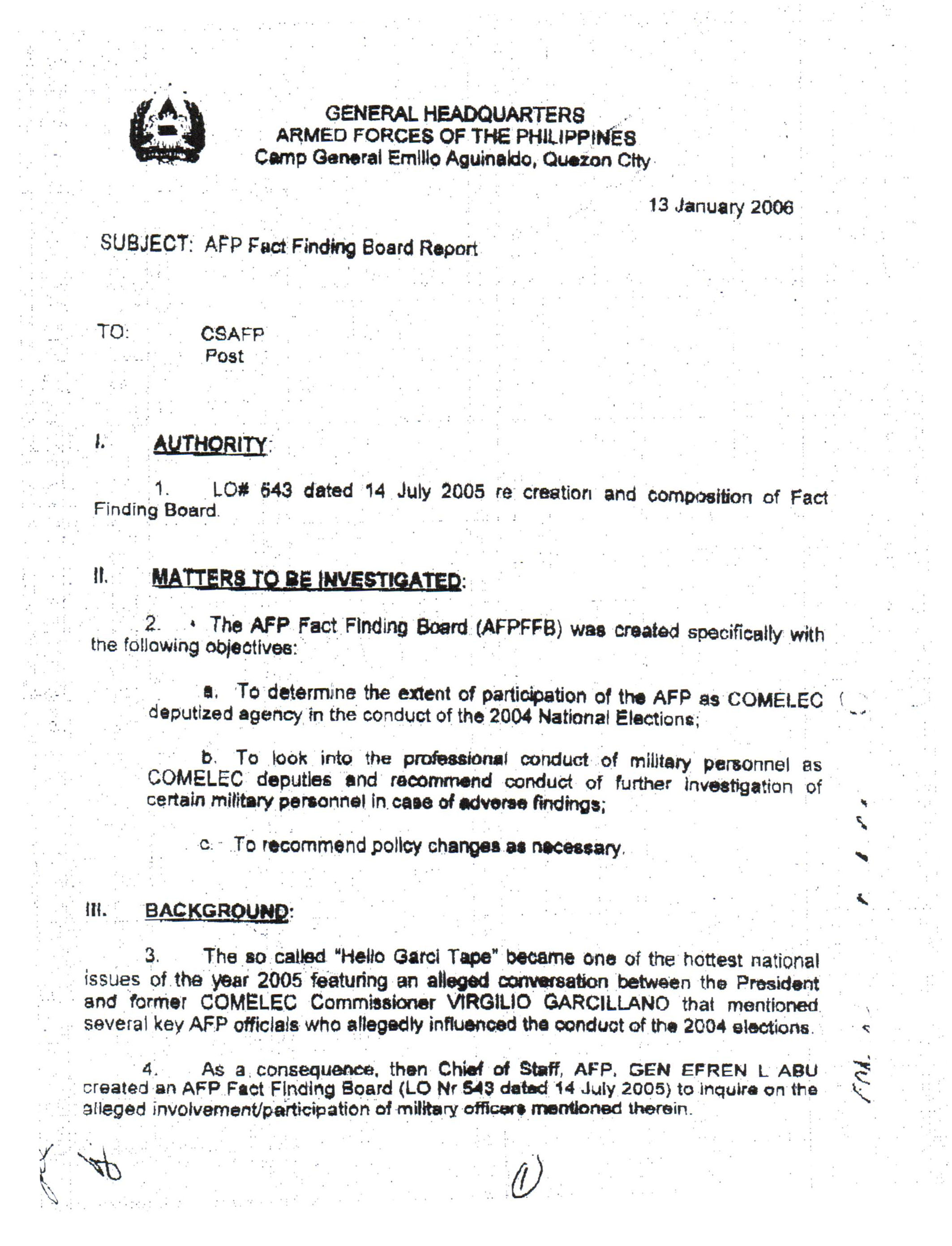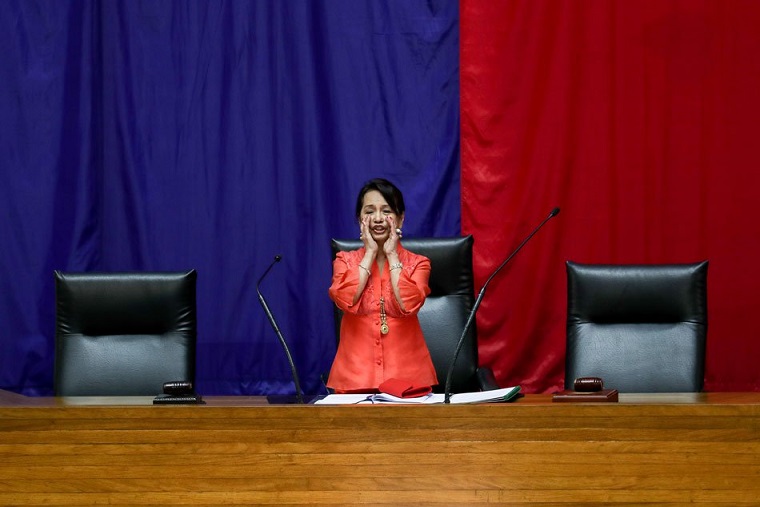By ELLEN TORDESILLAS and YVONNE T. CHUA
RETIRED Vice Admiral Mateo M. Mayuga once said he would bring the results of his fact-finding mission on the purported involvement of the military in the cheating in the 2004 presidential elections that enabled Gloria Macapagal-Arroyo to stay in power to his grave.
But Mayuga isn’t getting his way. Recently, President Benigno S. Aquino III declassified his “secret” report, popularly known as the Mayuga Report, and the 15-page executive summary has made its way to the news media.
The document, however, does not contain the sensitive revelations offered by resource persons invited by the commission—70 in all, including 68 officers and enlisted personnel of the Armed Forces, a AFP civilian employee and Commission on Elections Region 9 director Helen Flores.
The revelations are instead buried in the voluminous transcripts of the investigation that measure a meter.
One of the most important revelations excluded from the 15-page report was the testimony of then AFP Vice Chief of Staff Lt. Gen. Rodolfo Garcia, commander of the 2004 Task Force HOPE (Honest, Orderly, Peaceful Elections), who urged the Mayuga Commission to have the funds allotted to his task force audited.
The transcripts showed that the one in control of these funds was Task Force HOPE’s deputy commander, Maj. Gen. Hermogenes Esperon, who was then the AFP deputy chief of staff for operations (J3).
Garcia had told Mayuga and four other commissioners that “a big amount of money” had been allotted for the military’s role of maintaining honest, orderly and peaceful elections, but he said, “I don’t think what was spent came close to what was given to us.”
The executive summary stated that Comelec released a total of P197 million to Task Force Hope for operational support, reservists and maintenance of mission and essential assets.
Of the P197 million, Lt. Col. Gilbert Gapay, the task force’s disbursing officer, said P101 million went to Intelligence Operations (J2).
Also not included in the executive summary were Garcia’s statements on the participation of the military in electoral fraud, as documented in the “Hello, Garci” tapes, a series wiretapped recordings of conversations of then Elections Commissioner Virgilio Garcillano with Arroyo and other government and private personalities.
“I think that is true…Whether you deny it to yourself or not, we have to accept it that our officers have been involved in this,” Garcia said.
He told the investigators to ask everybody in the military if they believe that officers were capable of cheating. The answer, he said, would be “Yes.”
“There are people among us who allowed themselves to be used. I think everybody knows that. It was a fact,” he said.
Garcia said the hand of the Armed Forces officers in the cheating was being talked about in the military circle. “Let us not joke ourselves and try to delude ourselves in the idea na walang nangyari (that nothing happened) because in fact things are happening,” he said.
The then vice chief of staff challenged the factfinding board to “be brave” and make a truthful report. “If you do not do anything, the AFP will go to the dogs,” he warned.
Despite this, the Mayuga Commission cleared all but three military officials: Col. Jose F. Gamos, for joining the campaign sorties; Col. Rey Ardo, a principal staff of Esperon, for distributing leaflets of party-list group Aliance for Nationalsm and Democracy (ANAD); and Capt. Valentino Lopez, for offering Comelec’s Flores P50 million, and later P100 million, to manipulate election results.
In the 2004 elections, Lopez acted as Garcillano’s personal security officer without detail orders from the AFP, in violation of an executive order on the assignment of military personnel to civilian offices and officials.
Also not found in the executive summary was the testimony of then Col. Alexander Balutan who was ordered not to restrict—“luwagan” —cheating operators.
The Mayuga Commission cleared all the generals mentioned in the “Hello, Garci” tapes: Esperon, then Maj. Gen. Gabriel Habacon, Brig. Gen. Francisco Gudani (who was accused of favoring the opposition and was replaced by Col. Gomiendo Pirino) and Maj. Gen. Roy Kyamko. Arroyo appointed Esperon chief of staff in July 2006.
“There is no statement from the resource persons directly linking them (the generals) or signifying their involvement to any election fraud or anomaly,” the report said.
The board also concluded that “the AFP cannot be entirely faulted for some lapses in the conduct of the deputation duties,” citing overstreched manpower for election duties and lack of clearcut guidelines to frontline units as the chief reasons.
It said the AFP exerted its best efforts to discharge its deputation duties during the actual conduct of the election, noting the reduced incidents of election violence.
Mayuga and his fellow commissioners recommended that the AFP coordinate with Comelec and other deputized agencies for future election concerning board of election duties; deputation by names; clustering of precincts; utilization of military camps for canvassing; and other related laws and issuances.
It also recommended further investigation to determine culpability of some AFP personnel allegedly involved in the 2004 election fraud and to create study groups to formulate policies on AFP participation in future elections.
The fact-finding board was created on July 14, 2005 by then AFP Chief Efren Abu to inquire into the alleged participation of military officers in the 2004 elections as mentioned in the “Hello, Garci” tapes.
The fact-finding board was composed of Mayuga, Maj. Gen. Raul Relano, Maj.Gen Romeo Alamillo, Commodore Emilio Marayag and Col. Caridad Aguilar.
The Mayuga Report — Posted by VERA Files
//


